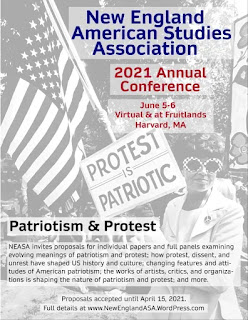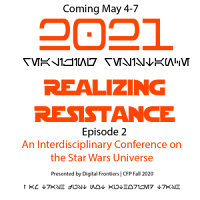The latest from the Mythopoeic Society: http://www.mythsoc.org/mythcon/mythcon-52.htm
Mythcon 52
New Dates! July 29 - August 1, 2022

Mythcon 52
The Mythic, the Fantastic, and the Alien
Albuquerque, New Mexico
July 29 - August 1, 2022
ANNOUNCEMENT
Due to ongoing health concerns and the realization that we cannot now plan something
that may violate future New Mexico state health and safety regulations, whatever they are in July-August of this year, the Council of Stewards has
decided to postpone the next in-person Mythcon until summer of 2022; the date will be July 29-August 1, 2022. Our venue and
Guests of Honor have all agreed to this change and the conference theme will remain the same.
Your membership will automatically "roll over" to next year but if you
cannot attend next year, please contact mythcon@mythsoc.org and request a
refund of your Mythcon 51 membership. For those who paid the non-member
prices, your membership in the Mythopoeic Society associated with
joining
the conference will be extended by a year (again!). Thank you for
understanding.
Theme: The Mythic, the Fantastic, and the Alien
Mythcon 52’s theme provides multiple opportunities to explore the Other in fantasy and mythopoeic
literature. Tolkien spoke in “On Fairy-stories” of “the desire to visit, free as a fish,
the deep sea; or the longing for the noiseless, gracious, economical flight of a bird.” We invite
discussion about the types of fantasy that are more likely to put us into contact with the alien, such
as time portal fantasy and space travel fantasy. In addition to Inklings, some writers who deal particularly
well with the truly alien who might be explored include Lovecraft, Gaiman, Le Guin, Tepper, and others.
Other topics that might be fruitfully explored are: depictions of the alien Other in film and television
(
Contact,
Arrival, HBO’s
Watchmen, etc.); developing constructed languages that
are truly different from those of Earth-based humans; fantastical Others in indigenous myths (such as
Coyote and Spider Woman from Native American mythology); and American folklore about the alien (flying
saucers, alien abduction, Area 51, Roswell).
Guests of Honor

Rivera Sun - Author Guest of Honor
Rivera Sun is a change-maker, a cultural creative, a protest novelist, and an advocate for nonviolence
and social justice. She is the author of
The Dandelion Insurrection,
The Roots of Resistance, and other
novels. Her young adult fantasy series, the Ari Ara Series, has been widely acclaimed by teachers, parents, and peace
activists for its blending of fantasy and adventure with social justice issues. Going beyond dragon-slayers and sword-swingers,
heroes and sheroes in Ari Ara’s world stop wars and wage peace. They use active nonviolence to make powerful change. In all
her works, Rivera Sun advocates that if we want to build a culture of peace, we have to tell new stories that still appreciate,
but go beyond the old myths, epics, and legends that rehash outdated war and violence narratives.
The Way Between, the first
book in the Ari Ara Series, has been read by numerous groups of all ages, while the second book in the series,
The Lost Heir,
is the winner of the 2019 Nautilus Award Silver Medal in Middle Grade Fiction.
Rivera Sun’s essays have been published in hundreds of journals nationwide. She is a frequent speaker and presenter at schools,
colleges and universities, where
The Dandelion Insurrection has been taught in literature and political science courses.
Rivera Sun is also the editor of
Nonviolence News, an activist, and a trainer in making change with nonviolence. Her
essays and writings are syndicated by
Peace Voice and have appeared
in journals nationwide. She lives in an Earthship house in New Mexico.

David Bratman - Scholar Guest of Honor
David Bratman is has been reading Tolkien for over fifty years, and has been writing Tolkien
scholarship for nearly as long. His earliest contribution to the field was the first-ever published Tale of Years
for the First Age, right after
The Silmarillion was published. Since then he’s published articles with titles
like “Top Ten Rejected Plot Twists from
The Lord of the Rings,” “Hobbit Names Aren’t from
Kentucky,” and “Liquid Tolkien” (on Tolkien and music). He’s been co-editor of
Tolkien Studies:
An Annual Scholarly Review since 2013, and has written or edited its annual “Year’s Work in Tolkien
Studies” since 2004. David edited
The Masques of Amen House by Charles Williams and contributed the
bio-bibliographical appendix on the Inklings to Diana Pavlac Glyer’s
The Company They Keep. He has also
written on C.S. Lewis, Ursula Le Guin, Mervyn Peake, Neil Gaiman, and others. For the Mythopoeic Society he was editor
of the monthly bulletin
Mythprint for fifteen years, and has worked on many Mythopoeic Conferences, including
serving twice as chair. He’s a retired academic librarian and an active classical music reviewer who lives with
his wife, Berni (a soprano and violinist), and two cats in a house they call Minnipin Cottage.
Location
Please plan to join us at the
Ramada
Plaza Hotel by Wyndham in
Albuquerque, New Mexico, for Mythcon 52. Albuquerque is a wonderful
“destination city” where Mythcon has been held only once before in 2011 (
Mythcon 42)
and is well worth the return.




